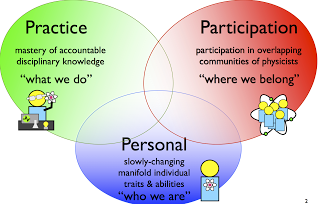Identity
The Identity Project tracks physics students' identities as physicists across the undergraduate curriculum, focusing on the middle years.
As students develop as physicists, they need to develop strong physics and mathematics intuitions, coordinating physics and mathematics ideas learned across the curriculum. The structure of the physics curriculum is deeply cyclic: ''running threads'' of content introduced in the first course are developed and deepened in later courses, often with more elaborate mathematical formalism. Accountable disciplinary knowledge (ADK) is more than just content knowledge: it also encompasses problem solving skills that cut across content areas, and the ways that ''what counts as physics'' vary by setting. To account for changes in ADK, we must investigate growth in both knowledge and skills in multiple settings.
Towards that end, my lab records students in formal and semi-formal physics contexts, tracking individual students as they stream through the curriculum. We look at both lab courses like Modern Physics lab and theory courses like Introduction to Quantum Mechanics. We look for how ADK changes by context and over time, and how students respond to changing expectations.
In addition to research on how students' conceptual and procedural understanding of physics and mathematics develop, I am interested in how students become physicists: how they come to identify with and participate in Professional Communities of Practice in physics, such as research groups and study groups for courses. This topic also includes physicist-like attitudes about the nature of science and inquiry and beliefs about what constitutes ''good physics''.
 To conceptualize and model identity development, I work on theory building on two different scales. At themacroscopic scale, I model identity as having three integral parts:
To conceptualize and model identity development, I work on theory building on two different scales. At themacroscopic scale, I model identity as having three integral parts:
- Personal: Who we are: (also, who we want to be) when people say "I am" or "I am not"; or when they say "I (don't) want to be".
- Practice: What we do: Students actions and expectations about what constitutes physics, how to do physics,and content knowledge all indicate growing expertise. This section includes aspects of ADK and BESM as well as habits of mind.
- Participation: Where we belong: A crucial part of identity is recognizing others and having others recognize you. This part of the identity framework comes largely from the Communities of Practice literature.
At the mesoscopic scale, I look for how to interpret data -- students' actions, behaviors, and discourse -- and connect it to the macroscopic scale. There are three current projects involved here:
- BESM talk: Brief, Embedded, Spontaneous Metacognitive talk tells us about students' expectations of the nature of physics and their role in physics as a discipline. It's co-located with technical content, so it also informs us about their ADK, and it is a good marker of how students appropriate physics content: make it their own and incorporate it into their worldviews. There's a version of my Winter 2013 AAPT talk available on youtube.
- Physics Idiom: Physicists use phrases like "far away", "to first order", and "nice and symmetric" to convey a host of technical physics and mathematics content, and they are also used in less technical senses to communicate idiomatically. Physics idioms function as a sort of shibboleth, marking people who understand the culture of physics from people who don't. Students need to learn the technical senses of these phrases, their use in physics problem solving, and their use in communicating with other physicists.
- Navigation Case Studies: There are a lot of paths into, through, and out of a physics degree. In this project, we collect longitudinal interviews and classroom observations of physics majors and minors. We're especially interested in their idea of what a physicist is and does, how that idea changes with time and experience, and whether they see themselves as a physicist or aspiring physicist.
Recent projects have involved:
- Epistemic framing during problem solving: We can frame an activity expansively to connect it to part of a larger understanding, or we can frame it more narrowly to focus on the particular task at hand. Students often frame physics problems narrowly, but a mark of expertise is the ability to frame more expansively. Additionally, students generally frame physics problem solving as a serious endeavor, but occasionally change to a productively silly frame. The details of students' framing tell us about what counts as physics.
- Epistemic framing during lab work: Framing is how we understand "what's going on here". In this project, we look at students' behavior and discourse in Advanced Lab to infer how they work in groups to solve problems. We compare their work in lab groups to their self-professed beliefs about what counts as physics and to what similar students do when working on conventional physics problems. The details of students' framing tell us about what they think counts as physics, which might be different than what they say counts as physics in interviews. This matters because if there's a mismatch between what students do in class and what they believe is important, they might get disenchanted with physics, or leave altogether.
- Physics students perceptions of physicists: We examine students' perceptions of what it means to be a physicist. The results revealed four different perceptions of what it means to be a physicist, with a clear distinction in the level of exclusivity students associate with being a physicist and differences of importance of research and its association with being a physicist. We also find a relationship between perceptions of physicists and students' goal or mastery orientation. The paper highlights a need for faculty to not just emphasize the importance of research to students academic development but also to further demonstrate and explain what research entails and the role it plays in a physicists identity.